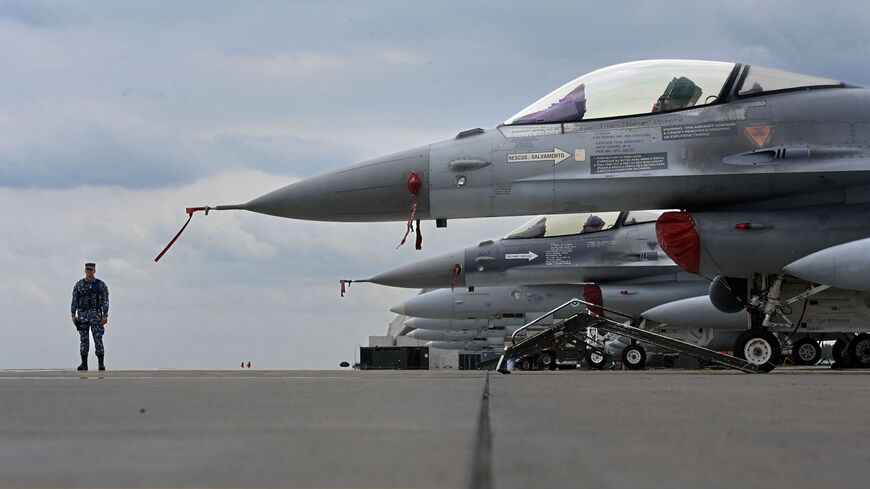The presidents of Turkey and the United States came together Tuesday for a rare face-to-face meeting on the fringes of NATO’s Vilnius summit after Turkey greenlighted Sweden’s membership to the alliance and Washington signaled it would move forward with the sale of the F-16 fighter jets to Turkey in consultation with Congress.
US President Joe Biden and his Turkish counterpart Recep Tayyip Erdogan came together for a bilateral talk, which lasted more than an hour, at the end of the summit’s first day, following an announcement by the military alliance’s secretary general that NATO had agreed to “extend an invitation” to Ukraine to join the alliance when “allies agree and conditions are met.”
Biden called the NATO summit “a historical moment,” thanking Erdogan for his leadership, presumably for his support to Ukraine’s NATO candidacy as well as his agreement for greenlighting Sweden’s bid.
Erdogan, for his part, jokingly classified their previous meetings as “warming up sessions” and the present one as the “first presidential-level meeting” of the newish Turkish-American Strategic Mechanism, a consultation platform between the two allies. “Now we are starting a new process,” Erdogan said, adding that he had “a period of five years” — an allusion to his electoral victory last May which gives him another term at the head of Turkey. A cryptic official statement from Turkey's Information Directorate said that the two leaders discussed political, economic and commercial ties, security cooperation and regional issues.
Until now, the two leaders’ meetings are rare and brief, at the sidelines of international meetings, such as G20 or NATO. Unlike his Greek counterpart, Erdogan has not been invited to the White House. Neither has he been invited to Biden’s annual Democracy Summit. But the two leaders — and their foreign ministers — held several phone calls in the lead-up to last night’s deal, where the United States' sale of F-16 fighter jets to Turkey was one of the bargaining chips.
Ahead of the two leaders’ meeting, US Defense Secretary Lloyd Austin spoke with his Turkish counterpart Yasar Guler to “discuss support” for Turkey’s military modernization.
"They ... discussed the positive talks between Turkey, Sweden, and NATO Secretary General Stoltenberg, as well as the Department of Defense's support for Turkey’s military modernization," the readout from the Pentagon said. The Turkish statement echoed the same line but mentioned the F-16s explicitly.
Turkey wants to buy $6 billion worth of F-16 fighters and nearly 80 modernization kits for its existing warplanes. Though Ankara publicly says the sale of the fighter jets to Turkey was not quid pro quo for Ankara’s approval of Sweden’s NATO bid, Turkish and political analysts such as German Marshall Fund Turkey representative Ozgur Unlusarciklioglu maintain that the sale has been one of the crucial parts of a complex accession agreement reached at the 11th hour at the Lithuanian capital.
The NATO press release on Sweden joining the alliance says Turkey and Sweden will continue cooperation against terrorism, pledging Stockholm's support of Turkish-EU ties and economic cooperation with Ankara. In a thinly veiled reference to formal or informal arms embargoes to Turkey, it adds that the sides "commit to the principle that there should be no restrictions, barriers or sanctions" to defense trade and investment among allies. "We will work towards eliminating such obstacles," it reads.
The Joe Biden administration gave a firm backing for the F-16 deal. National security adviser Jake Sullivan said Tuesday before the NATO meeting that Biden put “no caveats or conditions" on the transfer and "intends to move forward with that transfer in consultation with Congress.”
On Monday, US Senate Foreign Relations Committee Chairman Bob Menendez, who has been a longtime critic of Turkey, also acknowledged that there was a temporary “lull” in Turkey's "aggression against its neighbors," in a reference to Greece. Tensions have run high between the Aegean rivals as their Western allies watched nervously throughout 2022, but Ankara and Athens managed to defuse tensions in post-disaster diplomacy. A week before the summit, the Turkish Defense Ministry said that the two countries would restart confidence-building talks, which were suspended after Erdogan lashed out at Greek Prime Minister Kyriakos Mitsotakis for lobbying Congress against military sales to Turkey. Tomorrow, the two leaders are expected to come together for a bilateral meeting — the first face-to-face after Erdogan “wrote off” Mitsotakis a year ago.
Menendez, a Democrat, said he was in talks with the Biden administration about the hold he's placed on future US sales of F-16 fighter jets to Ankara and he could make a decision within the next week about the status of that hold. "If [the Biden administration] can find a way to ensure that Turkey's aggression against its neighbors ceases, which there has been a lull the last several months, that's great but there has to be a permanent reality."
Menendez's timeline matches some of the accounts from pro-government media outlets on the Turkish parliament’s approval of Sweden’s accession protocol.
According to speculation by some of the press accompanying Erdogan, the presidency will send the Swedish protocol to the Turkish parliament later this week and it would come before the Foreign Affairs Committee and then the Parliament's General Assembly within the week. Ankara has not confirmed.
“On F-16s, they keep telling us that there is Congress to go through. Well, we have the parliament approval to think of [on Sweden’s membership bid],” Erdogan said Monday morning as he headed for NATO. Erdogan's Justice and Development Party and its small nationalist ally, which have a majority in parliament, can hold up the vote or reject it if they chose to do so. Meanwhile, Sweden's membership still has to be ratified by Hungary.
Russia: 'Turkey has obligations'
The Kremlin, meanwhile, said Sweden’s accession to NATO will definitely have “negative consequences” for Russia, but it was careful not to direct its anger toward Turkey. Speaking on Tuesday, Kremlin spokesperson Dimitry Peskov stressed that Moscow understands Ankara's obligations.
"Turkey is a member of the North Atlantic Alliance. Turkey has its obligations; Turkey is committed to its obligations. This has never been a secret for us, and in this regard, we have never worn rose-colored glasses," Peskov was quoted as saying by Russian news outlets.
What does Turkey get from the European Union?
The Washington connection is only part of the complex diplomacy that has led to Erdogan’s last-minute approval of the Swedish membership bid. The seven-point press statement also refers to Turkey’s relationship with the European Union — an organization that shares 22 members with NATO. Under the agreement Sweden pledges to “actively support” efforts to reinvigorate Turkey’s EU accession process, including a Turkey-EU customs union and visa liberalization. But many European Union leaders and members of the European Parliament met this news with skepticism, stony silence or selective applause, celebrating the deal but making no reference to Turkish-EU ties.
Turkey is a longtime candidate for the 27-member union. It applied for membership in 1987 but was only recognized as a candidate in 1999. Accession negotiations, which started in 2005, ground to a halt over political disagreements, the Cyprus question and democratic backsliding. In 2018 the European Council, the decision-making body of the union, announced that accession negotiations were at a standstill, implicitly acknowledging that Turkey was no longer on the “membership track.”
“Turkey has been waiting at the gate of the European Union for over 50 years now,” Erdogan said Monday, claiming that Brussels should clear the path for Ankara’s accession to the EU before his country approves Sweden’s bid for NATO membership.
Engin Solakoglu, a former Turkish diplomat who served in Brussels, told Al-Monitor that Erdogan knows membership is no longer on the table. “Those who think that Erdogan’s last-minute insistence on the Turkish-EU ties is posturing are wrong,” he said. He does think he can go back to the EU table on the modernization of the EU-Turkey customs union, a far-reaching trade deal between Turkey and the EU that dates back to the 1990s, and visa liberalization for Turkish citizens who complain of the tedious procedures when they travel to Schengen space.
Easing some of the burdens on the Turkish citizens was part of the agreement reached between Ankara and Brussels to stop the flow of irregular migration through Turkey to Europe. However, the European Union said Ankara failed to make the necessary legal changes — including an amendment of its definition of terrorism — to finalize any liberalization.
Amanda Paul, a senior policy analyst at the Brussels-based European Policy Center, agrees. “Turkey’s membership is a pipe dream,” she told Al-Monitor. “The country simply does not fulfill the Copenhagen criteria anymore,” referring to the minimal democracy and rule-of-law conditions for candidacy.
However, both think that there may be some limited space to breathe life into the dormant ties, particularly after the European Council asked last week the European Commission and Josep Borrell, the high representative for common foreign policy, to prepare a report on Turkey. Charles Michel, who met with Erdogan Monday, said that the report would enable looking at Turkish-EU ties in a “strategic and forward-looking manner.”
“I consider the report to be a positive development because it may create change in a relationship that has become very toxic,” Paul told Al-Monitor. “I think the low-hanging fruit [in any positive change in ties] would be the customs union modernization, which Turkey wants even more now because of the economic difficulties that the country is having.”
“What Erdogan wants from the European Union — and the West in general — is money and prestige and these are often interlinked,” said Solakoglu. “Erdogan is aware that the Gulf tours to find cash or delayed gas payments from Russia are not going to ease Turkey’s huge economic problems. But sitting at the table with the European Union would be a serious message to foreign investors and to credit companies. And at home, he would simply try and sell it as a victory, particularly in the unlikely case there is some improvement on visas.”








